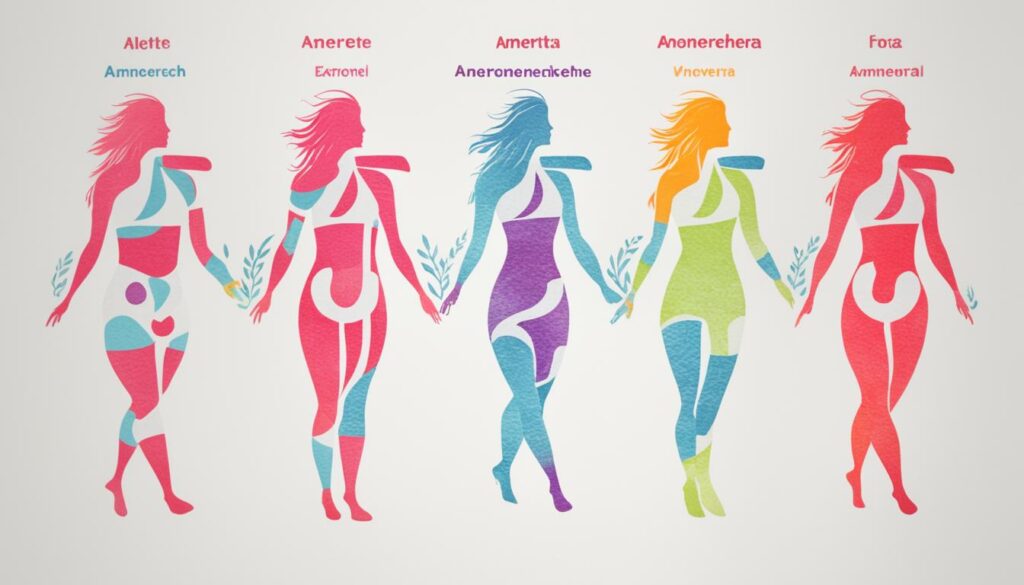Ever thought that losing weight might change your period? I’ve wondered about the connection between losing weight fast and menstrual bleeding. Turns out, when we change our weight, it affects our periods big time.
Losing weight quickly can mess with our hormones and body’s metabolism. This can cause our periods to be off, maybe with unusual bleeding. In fact, lots of women who do hard workouts might have issues with their periods. It shows how closely losing weight and our periods are linked.
Let’s look into this more: How losing weight fast changes your monthly cycle and what it means for your health overall. Knowing these links can help us think smart about losing weight and keeping healthy.
The Impact of Weight Loss on Menstrual Cycles
Body weight is a big deal for our periods. Losing weight changes them in many ways. You might wonder how and why.
How Body Weight Affects Hormone Production
Our weight affects hormones a lot. Estrogen, a key hormone, is made by fat cells. Too fast weight loss can mess up this hormone balance. Periods might become lighter or even stop This is most likely if we lose weight super quickly or if our BMI gets too low.
Stress Response and Menstrual Changes
Losing weight fast can stress our body out. This stress can mess with how our menstrual cycle works. If you diet too hard or exercise a lot, your periods might become weird or stop.

The Role of Body Fat in Menstruation
The amount of body fat is key for regular periods. Too little fat can make periods disappear. Too much fat can make them crazy heavy or off schedule. It’s a fine balance for a healthy cycle.
- Aim for a healthy BMI between 18.5 and 24.9
- Lose weight gradually, about 1-2 pounds per week
- Maintain a balanced diet rich in nutrients
- Exercise moderately, avoiding extreme workouts
Everyone is different, so not all advice fits you. If you worry about your period due to weight loss, see a doctor.
Can Rapid Weight Loss Cause Menstrual Bleeding?
Many women face surprise menstrual bleeding after losing weight quickly. It’s more common than you think. Around 1 in 5 women have heavy periods, the CDC reports. Fast weight loss can alter hormone levels, changing menstrual patterns.
Losing weight fast stresses the body. This stress can throw off hormone balance and disturb your menstrual cycle. This leads to irregular periods or surprise bleeding. Keep in mind that weight loss isn’t the only cause of these changes.
If you have irregular bleeding for more than a few months, see a doctor. Normally, periods come every 21 to 35 days and last seven or fewer days. Any difference might mean something is wrong.
- Weight loss can affect hormone production
- Stress from rapid weight loss may disrupt menstrual cycles
- Other health conditions could cause irregular bleeding
While losing weight is good for your health, do it slowly. Losing 1-2 pounds a week is a good pace. This way, you keep your hormones in check and lower the chance of menstrual issues. Always talk to a doctor about your concerns during weight loss.
Understanding Amenorrhea: When Periods Stop
Amenorrhea means you either never get your period or it stops. It’s more common than you might think. Let’s look at the kinds, why it happens, and the problems it can bring.
Types of Amenorrhea
There are two types:
- Primary amenorrhea: When your period never starts
- Secondary amenorrhea: When it stops after starting

Causes of Secondary Amenorrhea
Secondary amenorrhea is caused by different things. Some common reasons are:
- Extreme weight loss
- Too much exercise
- A lot of stress
- Some health problems
Health Risks
Amenorrhea can cause big health problems if you don’t deal with it. It can lead to:
- Weaker bones
- Not being able to have kids
- More chances of getting heart disease
If you have amenorrhea, it’s super important to see a doctor. They’ll find out why and make a plan to keep you healthy.
The Relationship Between BMI and Menstrual Health
BMI is important for menstrual health. As a woman, I know how weight changes can affect my period. Let’s learn about this link and how body weight can change our periods.
A good BMI range is between 18.5 and 24.9 for health. When I stay in this range, my cycles are on time. It’s always predictable!
What happens when we gain or lose weight? Hormones might get out of balance. This can make periods irregular or stop them.
- Underweight (BMI below 18.5): Can cause light or missed periods
- Overweight (BMI over 25): May lead to heavy or irregular periods
- Obese (BMI over 30): Increases risk of menstrual disorders
Quick changes in weight can mess up my cycle. My body has to get used to the new size. Slow, healthy changes are better for my period health.
Each body is unique. BMI is one thing that affects periods. Talk to your doctor if you’re worried about your cycle.
Irregular Periods and Weight Fluctuations
Weight changes and irregular periods often happen together. Let’s look into why this is and when to get help.
Signs of Irregular Menstruation
Irregular periods can show up in many ways. You could have cycles that are shorter than 24 days or longer than 38. You may also find your bleeding times unpredictable. This can come with really bad cramps. Weight ups and downs can mix up your period, creating these irregularities.
When to Consult a Healthcare Provider
If your periods are off for over three months, see a doctor. This is especially true if your weight has changed a lot. A healthcare provider can figure out if your periods are tied to your weight.
Diagnostic Procedures for Menstrual Irregularities
To really understand your periods, the doctor might do some tests. They could do:
- Physical exams to look for visible problems
- Blood tests to see your hormone levels
- Ultrasounds to check your internal organs
These checks can show if weight changes or something else is the cause. Knowing why is the start of getting better and getting your menstrual health back on track.
Restoring Menstrual Cycle After Weight Loss
Getting your period back after losing a lot of weight can be tough. It’s about balancing weight control with good eating. There are ways to help your cycle start again.
Start by eating a little more each day. Add healthy foods, not junk. This helps to reach a good BMI. You need foods with iron, B vitamins, and the right fats. They help your body make hormones.
Then, work on your exercise. Too much can mess with your hormones. Try activities like yoga or swimming. They help manage weight without too much stress.
- Eat a variety of fruits, vegetables, whole grains, and lean proteins
- Include healthy fats from sources like avocados, nuts, and olive oil
- Stay hydrated and limit caffeine intake
- Consider taking a multivitamin to fill any nutritional gaps
Getting your period back takes time. Be patient. If things don’t improve after a few months, see a doctor. They can give advice and check if there’s a bigger health issue.
Balancing Weight Loss and Menstrual Health
Finding a balance is key for health between losing weight and your cycle. I learned this through struggles with my weight. It’s important to lose weight in a balanced way to keep your cycles regular. Dr. Donald Hensrud suggests losing one to two pounds weekly for good health.
Gradual and lasting weight loss changes how you eat and move. It keeps your cycle normal and has good results long-term. Quick weight loss can mess with your hormones and your period.
For your health and cycles, eat right, exercise often, and reduce stress. Keep an eye on how your period changes while losing weight. It’s wise to talk with a doctor if your cycle acts up. They can help make sure your health and period stay okay.
